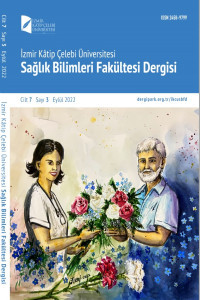Tip 2 Diyabetik Hastalara Verilen Diyabet Eğitiminin İçeriği ve Hastaların Hastalık Tutumu
Diyabet, Hasta Eğitimi, Hemşire, Tutum
___
- ADA. (2015). Standards of Medical Care in Diabetes. Diabetes Care, 38(1),20-33.
- AlSaggaf, W., Asiri, M., Ajlan, B., Afif, A.B., Khalil, R., Salman, A.B., et al. (2016). Reported Benefits of Insulin Therapy for Better Glycemic Control in Type 2 Diabetic Patients - Is This Applicable in Saudi Patients. Clinical Medicine Insights Endocrinology Diabetes, 8(9),13- 17.
- Chrvala, C.A., Sherr, D., & Lipman, R.D. (2016). Diabetes self management education for adults with type 2 diabetes mellitus: a systematic review of the effect on glycemic control. Patient Education and Counseling, 99, 926–943.
- Coulter, A., Parsons, S., & Askham, J. (2008). Where are the patients in decision-making about their own care? World Health Organization, on behalf of the European Observatory on Health Systems and Policies, 1-13.
- Demirtaş, A., & Akbayrak, N. (2009). Tip 2 Diabetes Mellitus’lu Hastaların, Hastalıklarına Uyum ve Kabullenme Kriterlerinin Belirlenmesi. Anatolian Journal of Clinical Investigation, 3(1),10-18.
- Didarloo, A., Shojaeizadeh, D., & Alizadeh, M. (2016). Impact of Educational Intervention Based on Interactive Approaches on Beliefs, Behavior, Hemoglobin A1c, and Quality of Life in Diabetic Women. International Journal of Preventive Medicine, 7,38.
- FEND. (2015). The Policy Puzzle: Is Europe Making Progress? https:// www.idf.org/sites/default/files/ThePolicyPuzzleBook.pdf. Erişim tarihi: 13.12.2015.
- Fischer, H. H., Moore, S. L., Ginosar, D., Davidson, A. J., Rice-Peterson, J. M., Durfee, M. J., et al. (2012). Care by cell phone: text messaging for chronic disease management. American Journal of Managed Care, 18(2),42-47.
- Hemşirelik Yönetmeliğinde Değişiklik Yapılmasına Dair Yönetmelik. Resmi Gazete 19 Nisan 2011/27910. Erişim tarihi: 07.02.2017.
- Holstein, A., Wohland, T., Patzer, O.M., Trachte, F., Kovacs, P., & Holstein, J.D. (2016). Accumulation of severe hypoglycemia at weekends and in warm seasons in patients with type 1 diabetes but not with type 2 diabetes. Journal of Diabetes and its Complications. doi: 10.1016/j.jdiacomp.2016.05.026. [Epubahead of print]
- IDF. Diabetes Atlas. International Diabetes Federation 6th edition, 2013. (https://www.idf.org/sites/default/files/EN_6E_Atlas_ Full_0.pdf Erişim tarihi: 13.2. 2016.
- Kim, S.H. (2016). Educational attainment moderates the associations of diabetes education with health outcomes. International Journal of Nursing Practice. doi: 10.1111/ijn.12454. [Epubahead of print]
- Lipska, K.J., Ross, J.S., Miao, Y., Shah, N.D., Lee, S.J., & Steinman, M.A. (2015). Potential over treatment of diabetes mellitus in older adults with tight glycemic control. JAMA Internal Medicine, 175, 356–362.
- Ozcan, S. (1999). Assessment of the effecting factors of the diabetic patients compliance, (Unpublished doctoral dissertation). Istanbul University, Istanbul, Turkey.
- Pillay, J.,Armstrong, M.J., Butalia, S., Donovan, L.E., Sigal, R.J., Vandermer, B., et al. (2015). Behavioral programs for type 2 diabetes mellitus: a systematic review and network meta-analysis. Annals of InternalMedicine, 163, 848–860.
- Ryan, J.G., Jennings, T., Vittoria, I., & Fedders, M. (2013). Short and longterm outcomes from a multisession diabetes education program targeting low-income minority patients: a six-month follow up. Clinical Therapeutics, 35, 43–53.
- OECD, (2016). Sağlık Sistemi İncelemeleri, Türkiye. Web sitesi. http:// sbu.saglik.gov.tr/Ekutuphane/kitaplar/OECDKITAP.pdf Erişim tarihi: 18.01.2016.
- Saleh, F., Mumu, S.J., Ara, F., Hafez, M.A., & Ali, L. (2014). Non-adherence to self-care practices & medication and health related quality of life among patients with type 2 diabetes: a cross-sectional study. BMC Public Health, 14, 431.
- Sarkadi, A., & Rosenqvist, U. (2004). Experience-Based Group Education in Type 2 Diabetes A Randomised Controlled Trial. Patient Education and Counseling, 53, 291–298.
- Satman, I., Omer, B., Tutuncu, Y., Kalaca, S., Gedik, S., Dinccag, N., et al. (2013). Twelve-year trends in the prevalence and risk factors of diabetes and prediabetes in Turkish adults-TURDEP-II Study Group. European Journal of Epidemiology, 28(2),169-180.
- Selçuk, K.T., Sözmen, M.K., & Toğrul, B.U. (2015). Diabetes prevalence and awareness in adults in the Balçova district in Turkey. Turkish Journal of Medical Sciences, 45, 1220-1227.
- Shawon, M.S., Hossain, F.B., Adhikary, G., Gupta, R.D., Hashan, M.R.,Rabbi, F., et al. (2016). Attitude towards diabetes and social and family support among type 2 diabetes patients attending a tertiary-care hospital in Bangladesh: a cross-sectional study. BMC Research Notes, 9(1),286.
- Steinsbekk, A., Rygg, L.O., Lisulo, M., Rise, M.B., & Fretheim, A. (2012). Group based diabetes self-management education compared to routine treatment for people with type 2 diabetes mellitus. A systematic review with meta-analysis. BMC Health Servers,12,213.
- Stuckey, H.L., Mullan-Jensen, C., Kalra, S., Reading, J., Wens, J., Vallis, M., et al. (2016). Living with an adult who has diabetes: Qualitative insights from the second Diabetes Attitudes, Wishes and Needs (DAWN2) study. Diabetes Research and Clinical Practice, 116, 270- 278.
- TEMD. (2015). Glisemik Bozukluklarda Tanı, Sınıflama ve Tarama. Diyabet Çalışma Eğitim ve Grubu. Mayıs 2015, Ankara. http://www. turkendokrin.org/files/7_DIYABET_Book%201_PRESS.pdf Erişim tarihi: 18.01.2016.
- The Diabetes Control and Complications Trial Research Group. (1993). The effect of intensive treatment of diabetes on the development and progression of long-term complications in insulin-dependent diabetes mellitus. The New English Journal Medicine, 329(14), 977- 986.
- Türk Diyabet Vakfı. (2016). Diyabet Hakkında Herşey. Web sitesi. http:// www.turkdiab.org/page.aspx?u=1&s=15. Erişim tarihi: 13.2.2016.
- Ünsal, E., & Kızılcı, S. (2009). Diyabetli Bireylerin Bilgi Düzeyi Öz Bakım Gücü ve A1c Düzeyi Arasındaki İlişki. Dokuz Eylül Üniversitesi Hemşirelik Fakültesi Elektronik Dergisi, 2(2),16-26.
- WHO. (2016). The Top Ten Causes of Death. Web sitesi. http://www.who. int/mediacentre/factsheets/fs310/en/ . Erişim tarihi: 13.2.2016.
- Yıldırım, B., & Özkahraman, Ş. (2011). Hasta Eğitiminde Hemşirenin Rolü. Sağlık ve Toplum, 21(1), 7-14
- ISSN: 2458-9799
- Yayın Aralığı: Yılda 3 Sayı
- Başlangıç: 2016
- Yayıncı: İzmir Katip Çelebi Üniversitesi
Türkiye’de Yaşlıların Yaşam Kalitesi: Sistematik İnceleme
Kalp Cerrahisi Sonrası Ağrı Kontrolünde Yeni Yaklaşımlar
Ezgi SEYHAN AK, Tuluha AYOĞLU, Didem KANDEMİR
Jülide Gülizar YILDIRIM, Bumin Nuri DÜNDAR
Tip 2 Diyabetik Hastalara Verilen Diyabet Eğitiminin İçeriği ve Hastaların Hastalık Tutumu
Sevgin SAMANCIOĞLU, Ekrem BAKIR, Uğur DOĞAN, Ayşe KARADAĞ, Ecem ERKAN, Ayfer AKTÜRK, Mihrap İLTER, Cihat AKTÜRK
Mehmet KULHAN, Nur Gözde KULHAN, Ümit NAYKI, Cenk NAYKI, Paşa ULUĞ
Yenidoğan Ebeveyn İlişkisinin Başlatılması ve Geliştirilmesi
Hemşirelik Bakımında El Masajı Uygulaması ve Yapılan Çalışmaların Sistematik Analizi
Gamze GÖKE ARSLAN, Şebnem ÇINAR YÜCEL
Süper Organ Mikrobiyota ve Obezite
Rana Nagihan TAŞKIRMAZ, Funda Pınar ÇAKIROĞLU, Reci MESERİ, Özge KÜÇÜKERDÖNMEZ
